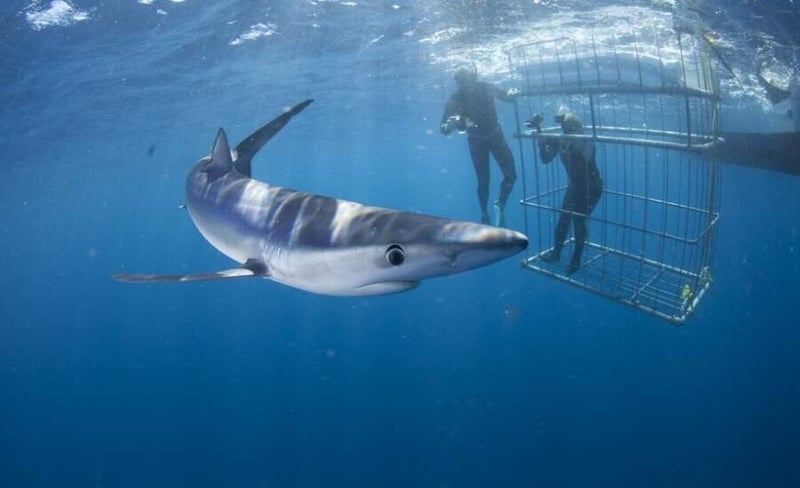The Roll of Shark Cage Diving in Eco Tourism
Written by: Linda Janse Van Vuuren Save to Instapaper
The news coming out of New Zealand a couple of years back that shark cage diving is now banned sent shock waves through the shark community.
Over the past number of years a bitter feud between the Paua divers and the two Great white shark cage diving operators that operate off Stewart Island has existed.
Immense pressure and opposition by the Paua diving community to cage diving here has ultimately led to The Court of Appeal in New Zealand ruling that as a Great white shark is a protected species, it may not be disturbed or pursued, and this makes cage diving with Great white sharks illegal.
The Paua divers’ arguments is that diving with sharks in cages puts swimmers at risk and changes shark behaviour.
You might be interested in Shark Cage Diving in South Africa or more specifically Shark cage diving in Hermanus.
A number of studies conducted in South Africa show that shark cage diving activity does not condition sharks and actually has a negative effect as there are few food rewards. If you refer to shark attack data from New Zealand since the advent of shark cage diving in New Zealand in 2007 there have been 13 shark attacks, only 2 of which have been fatal. None of the shark attacks took place close to Stewart Island. In fact the two previous attacks in the Stewart Island vicinity took place in 1999 and 2003, long before cage diving started in this area.
It’s an emotional argument no matter where you are in the world but my views are that the shark cage diving industry is incredibly important for shark conservation as well as having huge socio-economic benefits.
A shark is a difficult animal to see. In fact if you really want to see one, you need to go to great efforts to do so. The ocean is inaccessible for most people but even so marine mammals such as whales, dolphins and seals can often be spotted from the shore. The same cannot be said for almost all species of sharks. Even if you took a boat to an area inhabited by sharks you are still not guaranteed to see them. Their world is an underwater one and even if you went scuba diving, sharks have an inherently skittish nature and in most cases are likely to avoid you.I
In South Africa, we are extremely lucky to have opportunities of witnessing breaching and natural predation behaviour and from a distance, the great white sharks can be observed without having to attract them.
Having operators in shark hotspot areas on a daily basis also serves as a policing presence. Sharks are incredibly vulnerable and susceptible to poaching and a large part of a population can be quickly and easily wiped out.
Ironically it is not the government who protects the sharks, in fact in New Zealand in the tourist hub of Kaikoura, there were white shark teeth for sale, a so-called protected species. It was not the efforts of paua divers or even the anti-shark cage diving lobbyists who brought this to the fore, but rather tourists who had been cage diving and were educated.
In South Africa the strongest lobbyists for great white shark protection are in fact the cage dive operators. Time and time again it is them that are lobbying for prosecutions or bringing poaching infringements into the limelight, not the government who is actually tasked with doing this.From an environmental point of view sharks are vital to the balance of the entire eco system as can be attested by many scientific papers written on the subject. They are thus vital to our survival as well based on the ocean needing a healthy eco system.
Get new press articles by email
SEOPros is South Africa’s #1 SEO company, known for delivering powerful, data-driven digital marketing results. Founded in 2016, our boutique agency has a team of skilled professionals with over 120 years of combined experience. We help clients achieve exceptional organic growth—often doubling traffic and leads in just a few months. With offices in Cape Town, Sandton, Pretoria, and... Read More
Latest from
- Unforgettable Festive Season Experiences in Cape Town - Why Shark Cage Diving Tops the List
- How South African IT Companies Are Powering the Country’s Digital Transformation
- DEFENDoor® Sets the Standard in South African Home Security with Premium Security Doors
- House of Supreme – Premium Window Treatments and Shutters in South Africa
- 5 Reasons Businesses Should Partner with a Recruitment Agency
- A Guide to Determining Tax Residence for Individuals
- Container Rentals with RentalKing - Your Trusted Solution
- The Role of Payroll Services in South Africa's HR Transformation in 2024
- Enhance Your Food Storage Game with Polystyrene Containers in South Africa
- Dalucon Refrigeration Products SA (PTY) LTD Leading the Way in Insulated Panelling Manufacturing
- Cricket Shots Can Make Your Game
- Breaking Barriers - Papillon Recovery Centre’s Holistic Mental Health Approach
- Smart Financing Options for IT Infrastructure - Rent to Own and IT Financing
- Breaking Barriers - Papillon Recovery Centre's Holistic Mental Health Approach
- Revolutionizing Respiratory Care at Home - Limitless Health Transforms Patient Care in South Africa
The Pulse Latest Articles
- Education Is The Frontline Of Inequality, Business Must Show Up (December 11, 2025)
- When The Purple Profile Pictures Fade, The Real Work Begins (December 11, 2025)
- Dear Santa, Please Skip The Socks This Year (December 10, 2025)
- Brandtech+ Has 100 Global Creative Roles For South African Talent (December 9, 2025)
- The Woman Behind Bertie: Michelle’s Journey To Cape Town’s Beloved Mobile Café (December 9, 2025)
